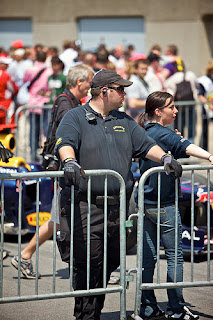To most of us, the ambassador seemed to alternate between changing his mind without warning and sticking to his decisions no matter what obstacles came up. His determination to establish an American school in Doha was an example of the latter. Another of his goals was to bring a priest to Doha in order that Catholic services could be held in Doha. There was no church in Doha. There were evangelical services held in people's homes, but the location wasn't well known, nor was there an ordained minister to lead the services. While I wasn't aware of the ambassador's goal to establish a church when I arrived, I learned of it toward the end of my time in Doha. The American school was a key to making it possible. Once the school had operated successfully for two years, and the public affairs officer's wife, the principal, was getting ready to leave Doha at the end of her husband's assignment, the ambassador had already lined up her replacement, a priest who had been working in Bahrain. Sponsoring the priest was an exception the ambassador was happy to make.
The ambassador's insistance that no Brit be hired to work at the embassy was a second example of a decision he never changed. But there were many other examples that posed more challenges to me.
 |
| Image of Marine Security Guards by US Mission Geneva, via Flickr.com |
Before I arrived in Doha, there were a few security incidents that appeared to target the embassy. A pipe bomb was found on the grounds of the Public Affairs annex and another was found attached to the vehicle of a local employee. There wasn't enough room for all the employees to park their cars on the grounds of the embassy within the walls. The local employees had to park outside the compound wall. But had their been an explosion outside the compound walls, there would likely have been significant damage to the main building.
I heard about the discovery of the pipe bombs during my consultations in Washington. The explanation was that the devices were very unsophisticated and would not likely have gone off at all. Some suggested that they may have been built by the ambassador or at his direction in order to bolster his argument in favor of getting Marines.
 |
| Image of gate keeper by Nelson Wu, via Flickr.com |
Since the Department wouldn't send Marines, the ambassador decided it was essential that the embassy contract with the most impressive local guard company for its guards. The local guards at the U.S. embassy in Bahrain were Nepalese Gurkhas. The ambassadors in the two countries were constantly competing with one another. Therefore, the ambassador decided we needed to have Gurkhas as our guards as well.
But the company in Bahrain wasn't represented in Qatar. That fact contributed to that company's very high bid for our guard contract solicitation. The two other companies that responded with bids did have a presence in Doha.
The ambassador had six reasons for doing - or not doing - something. Whenever I would talk over the process I went through to select a new employee, a contract, a new piece of furniture, he would roll out one of his reasons if the disagreed with me. His six reasons were:
- It is good for security.
- It is good management.
- It is good for morale.
- It is bad for security.
- It is bad management.
- It is bad for morale.
 |
| Gurkhas, image by Danny Nicholson, via Flickr.com |
The Department came back to say they would not fund the ambassador's preferred company because it would mean the cost of the local guard program would be higher than all our other budgets combined. At that point, the ambassador argued that selecting the company with Gurkhas would indeed be bad management because they weren't already in business in Qatar. But now suddenly the middle bid company was the one that was good for security and good management, leaving the low bidder as the only one that would be a bad management choice.
When the Department refused to fund the middle bid, too, the ambassador took the entire bidding process away from me and told me he would sort it out. He came back to me a few days later and explained that he had gotten agreement from the middle bidder to accept the contract at the low bid price. I don't know how I dared to tell him that I wouldn't sign the contract on behalf of the embassy because his negotiation behind the scenes with just one of the companies violated the solicitation process.
The ambassador signed the contract himself.
No comments:
Post a Comment